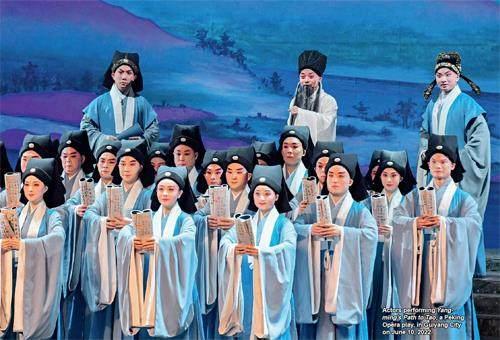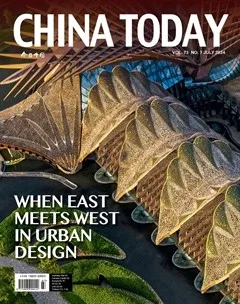Unity of Knowing and Doing
CUI WEIFANG


UNITY of knowing and doingis a key concept in ancientChinese philosophy.Discussions on knowingand doing can be traced back to the pre-Qin period (before 221 B.C.).The Book of History (Shangshu ), acollection of orations made by rulersand important ministers frommythological times to the middle ofthe Western Zhou Dynasty (c. 1100B.C.-c. 771 B.C.), and some other texts, says, “It is easy to gain knowledge,but it is hard to put it intoaction.” The relationship betweenknowing and doing continued tobe a subject of common discussionamong Chinese philosophersduring the following eras. Whiledifferent philosophers held variedviews on their sequential order andimportance, a philosopher fromthe Ming Dynasty named WangYangming (1742-1529) underscoredtheir unity, advocating for matchingones thoughts with their deeds.His thinking exerted a profound influenceon Chinese philosophy andculture.
Like the two sides of a coin,knowing and doing are internal andexternal indicators of a persons moral stature. In The Analects ,Confucius observed that wise menhave an agile mindset, hence theyhave a natural liking for clear runningwater ; benevolent peopleare genial and self-collected, andthey understandably have a strongpenchant for the views of mightymountains. To cultivate their moralcharacter, one needs to refine boththeir mind and behavior.
A New Account of Tales of theWorld (Shi Shuo Xin Yu ), a bookwritten in the fifth century on theremarks and anecdotes of somehistorical figures, includes a storyof two young friends named GuanNing and Hua Xin who lived in the third century. One day the twoyoung men came across a gold ingotwhile working in a vegetable field.Guan Ning did not show the slightestinterest in the ingot. Hua Xin, onthe other hand, picked it up withoutany thought, but soon realized thathis actions betrayed his craving formoney, which was despised by menof learning. He immediately feignedindifference to the gold and put itdown. On another day while thetwo friends were reading, an aristocratand his entourage drove bytheir house. Guan Ning was undisturbedwhile Hua Xin bolted out towatch the procession in admiration.Seeing that his friend was obsessed with fame, fortune, and power, GuanNing decided to end his friendshipwith Hua Xin.
This story is an example of howthoughts are instinctively reflectedin behavior. To be a person of noblecharacter, one must seek both hisinner world to improve, cleaninghis mind of ignoble thoughts andmending the defects in his behavior.No matter how hard people maytry to disguise themselves, they willshow their true colors sooner orlater.
The unity of knowledge andaction emphasizes practicability.As Wang Yangming said, knowingwithout applying is like learningnothing, while doing withoutunderstanding is like walking indarkness. People can acquire trueknowledge only after testing it intheir practice, and they can actappropriately only when guidedby good judgment and reasoning.Zhao Kuo, a general of the Stateof Zhao during the Warring Statesperiod (475 B.C.-221 B.C.), learnedthis lesson the hard way.
According to Zuo QiumingsChronicles (Zuozhuan ), Zhao Kuohad been a military buff since hischildhood. He read extensively andwas a great debater on the art ofwar. Despite not having any personalexperience in real battles, he neverthelessbelieved that he was thebest military strategist in the world.In the year 259 B.C., the State of Qinlaunched a war against the Stateof Zhao, but made little progressdue to the fierce resistance led byZhaos veteran general Lian Po. Toget Lian out of its way, the Qin armyspread rumors that the person theywere most afraid of was Zhao Kuo.The Duke of Zhao took the bait and replaced Lian Po with Zhao Kuo.Without any practical experience,Zhao Kuo mechanically followedthe military strategies described inthe military books he had read inthe battles, which unsurprisinglyended in the complete destructionof Zhaos 400,000 soldiers. He himselfwas also killed by arrows duringthe fighting.
In the case of Zhao Kuo, hismilitary knowledge had neverbeen tested on the battlefield, itwas hence not true knowledge.Later as the commander of anarmy, he simply aped the theoristshe had read about without adjustinghis tactics according to theactual situation at the forefront.His commanding was hence nonsensicaland futile.
By contrast, Wang Yangming, anoutstanding Chinese figure in bothcivil and military services, set a goodexample of applying what one learnsin their behavior. After puttingdown a number of insurrections,Wang was granted a title of nobilityby the Ming emperor, becoming oneof only three civil officials to receivethat honor during the dynasty thatruled from 1368 to 1644.
Wangs path to success was notall smooth sailing. During his earlieryears in the imperial court, he ranafoul of the powerful eunuch LiuJin, and was exiled to Longchang,a mountainous town in moderndayGuizhou Province, in 1506.The rigors of life in a culturally andeconomically backward region didnot dishearten the young man. Hetaught locals the advanced cultureof the Central Plains, including Confucianism,and was highly respectedby them. Meanwhile, he dedicatedhimself to the study of philosophy, which laid the foundation for hisschool of thought. After the downfallof Liu Jin, Wang was reinstatedto his old position, and soon showedmilitary genius. In 1517, he led anarmy to quell rebellions in Jiangxi,Guangxi, and Guangdong. Two yearslater he ended another riot startedby Prince Zhu Chenhao within amonth.
Through the various vicissitudesof life that he experienced,Wang Yangming always harboredthe Confucian ideals of pursuingself-improvement, having healthyfamily ties, running the countrywell, and pursuing world peace.Even when he was going througha difficult time, he did not flinch.Once he was put in a senior position,he served his country with hisacademic accomplishments andmilitary feats. He was good at bothlearning and practicing what helearned.
For Marxism, practice is the purposeof acquiring knowledge andknowledge impacts practice. Thisview accords with the traditionalChinese idea that "knowledge isthe prelude to doing, and doing isthe consummation of knowledge.”Both of these ideologies emphasizethe guiding role of knowing and thecentral position of doing in their relationship.
Since the founding of the CommunistParty of China (CPC) morethan 100 years ago, it has faithfullyapplied what it has learned intopractice. With the goal of pursuinghappiness for the Chinese peopleand rejuvenation of the Chinesenation, Chinese communists integratethe basic tenets of Marxismwith the specific realities and finetraditional culture of China. In so doing, they have made theoreticalachievements of Marxism withChinese characteristics. This hasenabled the CPC to overcome alldifficulties along the pathway, leadingthe nation to independence,greater strength, and eventuallyrejuvenation.
Carrying forward this fine tradition,President Xi Jinping haspresented the Thought on Socialismwith Chinese Characteristicsfor a New Era, which serves asthe guideline for the governanceof China during its new stage ofdevelopment. In order to realizethe Chinese dream of nationalrejuvenation, China can neitherfollow the capitalist path of foreignplunder and expansion, nor theunsustainable approach of pollutingthe environment and depletingresources. Instead we shouldadvance reform and opening-upand work for peaceful developmentthrough cooperation with peopleof other countries.
As we explore theories of Chinesesocialism and the Chinesepath to modernization under newcircumstances, we must always upholdthe principle that practice isthe sole criterion for testing truth,constantly garnering experienceand gaining knowledge during theprocess of applying what we havelearned. In doing so, we will furtherenrich Marxism, create a betterlife for our people, build a strongercountry, open an alternative pathof development for the referenceof other developing countries, andpresent a new model for humanadvancement.

